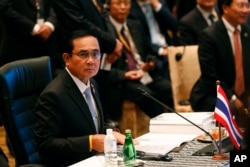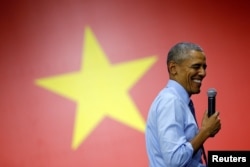Thailand's military-led cabinet could formally agree as soon as next week to pursue Trans-Pacific Partnership (TPP) membership after clear signals from cabinet members in favor of joining history's most expansive trade agreement.
Deputy Prime Minister Somkid Jatusripitak told Japanese business leaders in Tokyo that Thailand would ask Japan for its support in joining the U.S.-led trade pact when it considers additional members in 2018.
Commerce Minister Apiradi Tantraporn, who leads a TPP preparation committee, also said Tuesday the kingdom needs to improve its competitiveness to prepare to join the trade pact. After a visit to Washington in April, Apiradi said the U.S. government had encouraged Bangkok to modify rules and regulations in numerous sectors if it wants to become a signatory.
Thai diplomatic officer Jesda Tivayanond, who is attached to the prime minister's office, told VOA on Wednesday that Prime Minister Prayuth Chan-ocha is to meet next week with his international economic advisory team to discuss Thailand's TPP membership application.
A formal TPP decision by the cabinet could occur during its June 8 meeting, according to government officials.
Speaking at an event in late March organized by the U.S.-ASEAN Business Council and the U.S. Chamber of Commerce, Prayuth noted, “eventually we will have to join the TPP,” but he gave no timeline.
Prayuth, who led the military coup against the civilian government in May, 2014, said his military-led government, however, could find itself facing public protests – which the junta has outlawed -- against the controversial trade pact.
Farmers have threatened to organize demonstrations if Thailand decides to pursue TPP membership, according to domestic media reports.
The chairman of the National Farmers' Council, Prapat Panyachatrak, was more cautious on Wednesday when contacted by VOA, saying “we need more time” to make a decision on the organization's position on TPP.
Prapat, a former environment minister and deputy agriculture minister, has previously expressed concern that Thailand's inclusion in TPP could run small farmers out business and predicted “confrontation” if the government becomes a member of the free trade group.
Farmers raising pigs and chickens would be most affected because of potential imports of cheap pork and poultry from the United States, according to advocacy groups in Thailand.
In the pharmaceutical sector, Thailand would need to accept an extension of medicine patent protection from one to ten years, which would impact the national social health guarantee program and could make prices for some medications prohibitive, according to TPP opponents here.
“To make a decision on this important issue, the Thai people have to have the freedom to speak or express the demands,” BioThai Foundation secretary Witoon Lianchamroon told VOA. “We're afraid that the concerns of the people are not part of the decision” that will be made by the junta, which has restricted public expression since seizing power in a bloodless coup in 2014.
The U.S.-led trade agreement was signed last October by 12 countries.
Besides the United States, the other TPP signatories are Australia, Brunei, Canada, Chile, Japan, Malaysia, Mexico, New Zealand, Peru, Singapore and Vietnam.
If all of the participating countries do not ratify the pact within two years, then six original signatories, which account for 85 percent of the bloc's gross domestic product, must ratify it.
The math means approval by the United States is essential along with either Canada or Japan.
Six former U.S. defense secretaries have sent a letter to the U.S. congressional leadership a urging them to “support the TPP and to help the United States maintain its leadership in the 21st century.”
During his recent trip to Vietnam, President Barack Obama expressed hope for U.S. congressional ratification “by the end of this year,” although it faces opposition from some members of the president's own party, meaning the administration could be dependent on the Republican Party leadership to push it through.
The leading candidates of the two major parties, businessman Donald Trump and former Secretary of State Hillary Clinton, have both expressed opposition to the TPP in recent months.
Indonesia's government has also indicated it is open to the possibility of entering into the TPP.
The Philippines has also been exploring joining, but the country would have to overcome constitutional restrictions and modify some protectionist laws. The outgoing Aquino administration had expressed its intention to participate, but President-elect Rodrigo Duterte has not articulated his stance on TPP.
Besides Indonesia, the Philippines and Thailand, other possible second round entrants include Colombia, Costa Rica, Hong Kong, Panama, South Korea and Taiwan.







